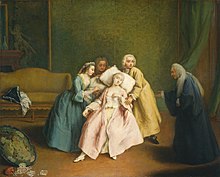
Back خفقان Arabic Сърцебиене Bulgarian Palpitació Catalan Palpitace Czech Gorguro’r galon Welsh Palpitation German Palpitacio Esperanto Palpitación precordial Spanish Palpitazioak Basque تپش قلب Persian
| Palpitation | |
|---|---|
 | |
| Artistic impression of a woman experiencing syncope, which may accompany heart palpitations | |
| Specialty | Cardiology |
| Differential diagnosis | Tachycardia |
Palpitations are perceived abnormalities of the heartbeat characterized by awareness of cardiac muscle contractions in the chest, which is further characterized by the hard, fast and/or irregular beatings of the heart.[1]
Symptoms include a rapid pulsation, an abnormally rapid or irregular beating of the heart.[1] Palpitations are a sensory symptom and are often described as a skipped beat, rapid fluttering in the chest, pounding sensation in the chest or neck, or a flip-flopping in the chest.[1]
Palpitation can be associated with anxiety and does not necessarily indicate a structural or functional abnormality of the heart, but it can be a symptom arising from an objectively rapid or irregular heartbeat. Palpitation can be intermittent and of variable frequency and duration, or continuous. Associated symptoms include dizziness, shortness of breath, sweating, headaches and chest pain.
Palpitation may be associated with coronary heart disease, perimenopause, hyperthyroidism, diseases affecting cardiac muscle such as hypertrophic cardiomyopathy, diseases causing low blood oxygen such as asthma and emphysema; previous chest surgery; kidney disease; blood loss and pain; anemia; drugs such as antidepressants, statins, alcohol, nicotine, caffeine, cocaine and amphetamines; electrolyte imbalances of magnesium, potassium and calcium; and deficiencies of nutrients such as taurine, arginine, iron or vitamin B12.[2]
- ^ a b c Robinson, Kenneth J.; Sanchack, Kristian E. (2019). Palpitations in StatPearls. StatPearls. PMID 28613787. Retrieved 2019-03-30 – via NCBI Bookshelf.
 This source from PubMed is licensed under the Creative Commons Attribution 4.0 International License.
This source from PubMed is licensed under the Creative Commons Attribution 4.0 International License.
- ^ "Vitamins That Can Cause Heart Palpitations". LiveStrong. com. Retrieved 2021-09-04.